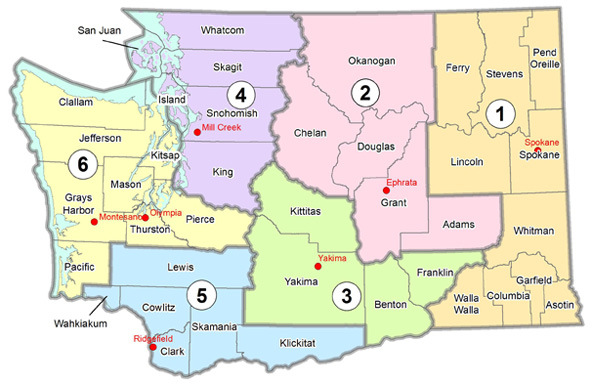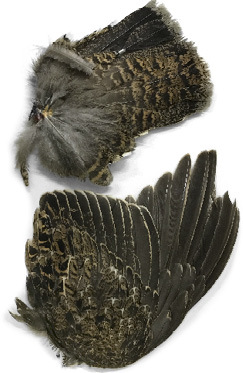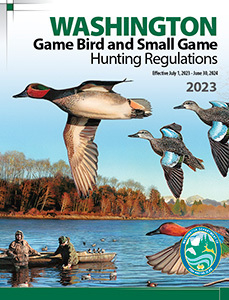Contact Information

Olympia Headquarters Office
Natural Resources Building
1111 Washington Street SE
Olympia, WA 98501
Dept. of Fish and Wildlife
PO Box 43200
Olympia, WA 98504-3200
Agency Receptionist: - (360) 902-2200
TDD: - (800) 833-6388
Wildlife Program: - (360) 902-2515
Report Wolf Incident (24 hrs) - (877) 933-9847
Enforcement Program: - (360) 902-2936
Poaching in Progress: - Dial: 911
To report a violation: (24 hrs) - (877) 933-9847
Fish Program: - (360) 902-2700
Hunter Education: - (360) 902-8111
Licensing Division: - (360) 902-2464
ADA Program - (360) 902-2349
Regional Offices
Region 1 - Spokane: - (509) 892-1001
2315 N. Discovery Place, Spokane Valley, WA 99216-1566
Region 2 - Ephrata: - (509) 754-4624
1550 Alder St. NW, Ephrata, WA 98823-9699
District Office - Wenatchee: - (509) 662-0452
3860 Highway 97A., Wenatchee, WA 98801-9607
Region 3 - Yakima: - (509) 575-2740
1701 S 24th Ave., Yakima, WA 98902-5720
Region 4 - Mill Creek: - (425) 775-1311
16018 Mill Creek Blvd., Mill Creek, WA 98012-1541
Region 5 - Ridgefield: - (360) 696-6211
5525 S 11th Street, Ridgefield, WA 98642
Region 6 - Montesano: - (360) 249-4628
48 Devonshire Road, Montesano, WA 98563-9618
WASHINGTON FISH AND WILDLIFE COMMISSION:
Barbara Baker, Commission Chair (Western Washington position, Thurston County)
Molly Linville, Vice Chair (Eastern Washington position, Douglas County)
James “Jim” R. Anderson (At-large position, Pierce County)
John Lehmkuhl, Ph.D. (Eastern Washington position, Chelan County)
Woodrow "Woody" Myers, Jr (At-large position, Spokane County)
Steve Parker (Eastern Washington position, Yakima County)
Tim Ragen, Ph.D. (Western Washington position, Skagit County)
Melanie Rowland, J.D. (At-large position, Okanogan County)
Lorna Smith (Western Washington position, Jefferson County)
WASHINGTON FISH AND WILDLIFE DEPARTMENT DIRECTOR:
Kelly Susewind
Buy Your Hunting License Online:
For License Information & Vendor Locations:
(360) 902-2464
Website:
Hunting Prospects:
Small game harvest reporting is now online!
You can now report your small game hunting activity online at fishhunt.dfw.wa.gov. Your reports of which species, dates you hunted, counties where you hunted, number of days hunted, and number of harvests are crucial for managing these populations. Even if you did not hunt or harvest, your report is essential. You can log your hunting activity throughout the season until March 31st. For more information, visit wdfw.wa.gov/hunting/requirements/harvest-reporting.
Note to small game hunters with a migratory bird permit and authorization: This reporting tool is not an alternative to the mandatory hunter reports required of any band-tailed pigeon, brant, sea duck, snow goose, or Canada goose authorizations and harvest report cards.
Washington Waterfowl Advisory Group
The Washington Waterfowl Advisory Group (WAG) was formed by WDFW in early 2003 to increase citizen involvement in the management of Washington’s waterfowl resources This group has members from a broad representation of waterfowl hunters throughout the state. Meetings are scheduled to provide advice to the department on a variety of topics, including planned expenditures of state migratory bird stamp revenues, waterfowl seasons, public access, and other topics. To learn more about the WAG, obtain meeting minutes, or contact a representative in your area, please contact the WDFW Waterfowl Section at (360) 902-2515 or please visit the website at https://wdfw.wa.gov/about/advisory/wwag. If you have comments to pass on to a WAG representative in your area, please email them to [email protected]. State that the comments are for WAG, and note your county of residence. Thank you to those past members for dedicating your time and providing your insights to help shape waterfowl conservation and management here in Washington.
Small Game Harvest Reporting Is Now Online
You can now report your small game hunting activity online at fishhunt.dfw.wa.gov. Your reports of which species, dates you hunted, counties where you hunted, number of days hunted, and number of harvests are crucial for managing these populations. Even if you did not hunt or harvest, your report is essential. You can log your hunting activity throughout the season until March 31st. For more information, visit wdfw.wa.gov/hunting/requirements/harvest-reporting.
Your Turkey Tag Dollars At Work!
Middle Wind Wildlife Habitat Improvement Project
The Middle Wind River Project is being implemented in collaboration with the Washington Department of Fish and Wildlife, the National Wild Turkey Federation, and the U.S. Forest Service to enhance Merriam’s wild turkey habitat on the Gifford Pinchot National Forest on the Mount Adams Ranger District. The project area has acreage classified as winter range habitat for use by big game and has year-round use by Merriam’s turkeys. The objectives of this work are 1) to increase available forage and year-round, diversified habitat, and 2) to encourage redistribution of Merriam's turkeys from private lands adjacent to the project area to public lands.
Turkey tag funding was used to treat noxious weeds on 132 acres of early to mid-seral habitat, purchase 500 pounds of native seed mix and 2,360 containerized native plants beneficial for turkey forage, and purchase trail cameras to monitor wildlife use of the treated areas. Volunteers from the National Wild Turkey Federation, Cascade Forest Conservancy, Washington Master Hunters, Washington Dept. of Fish and Wildlife, and the U.S. Forest Service committed three weekends to planting the 2,360 seedlings. A second phase of the project is planned to support thinning of overstocked Douglas fir stands and native seed to recover disturbed sites in the project area.
Report Wild Turkey and Upland Bird Sightings
Help manage Washington's game bird populations by reporting your observations of wild turkeys and upland birds. In July and August, brood surveys that count the number of chicks or poults with hens will help monitor productivity. The rest of the year, your observations will help monitor distribution: where birds are located, what habitats they're using, and how they might move seasonally.
For more information or to report sightings, visit
wdfw.wa.gov/hunting/management/game-bird-survey.
Forest Grouse Wing and Tail Collection
Successful forest grouse hunters are requested to submit a wing and tail from each forest grouse harvested. Wings and tails should be placed in a paper bag (one bag for each bird) and can be brought to any WDFW District or Regional office. The wings and tails can also be deposited in collection barrels placed around the state. Paper bags are available at each collection barrel. Check the WDFW website at https://wdfw.wa.gov/hunting/requirements/upland-birds/grouse-wing-tail-collection or contact a district office to find out if there are collection barrels in your area.

Help Stop Poaching
Every year poachers steal hunting opportunities and hundreds of animals from the citizens of Washington. You can help protect our resources by reporting violations.
The Turn In a Poacher (TIP) program provides the public the opportunity to confidentially report fish and wildlife violations.
A person who provides information that leads to an arrest may be eligible for a cash reward or bonus points.
WDFW Enforcement Program
(360) 902-2936
wdfw.wa.gov/enforcement/reporting_violations.html
Turn In a Poacher
877-WDFW-TIP • (877-933-9847)

